Fictorum is a 3rd Person Action game that has us take on the role of the last surviving wizard of the famed Fictorum order. The entire order has just been slain by an Inquisition army and knowing full well they will pursue you till the end of your days, you instead choose to rush straight for their stronghold in an attempt to murder their leader. You are given a few choices of what type of mage you’d like to start off with, and are immediately thrown into the turn-based over-world with the Inquisitor armies right on your tail. To top it off, the world has been consumed in a deadly miasma that spawns monstrous beings into existence, with humanity now only being able to survive on mountain tops.
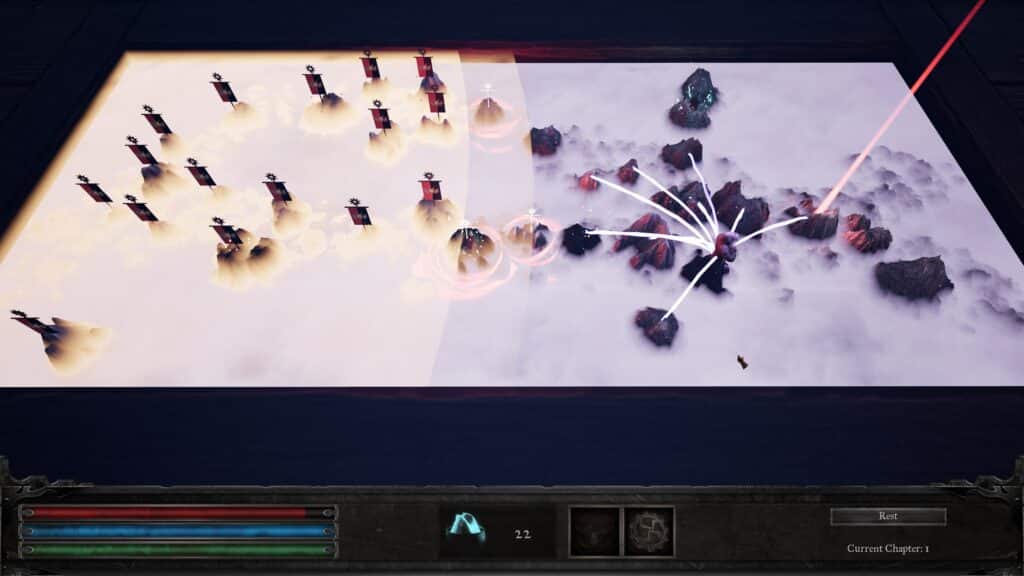
Your overall goal on the over-world will be to make your way across these mountain tops and choosing the quickest route to a teleporter that will take you to the next area. It plays out similar to the choose your own adventure genre as every mountain you visit will have a new event to survive or take advantage of. As a Fictorum, even starting off you are far more powerful than most other beings, but you are by no means immortal. You still bleed the same as anyone and the real danger comes from the fact that no one is insane enough to try to take you on single-handedly, you’ll always be facing sizable groups.
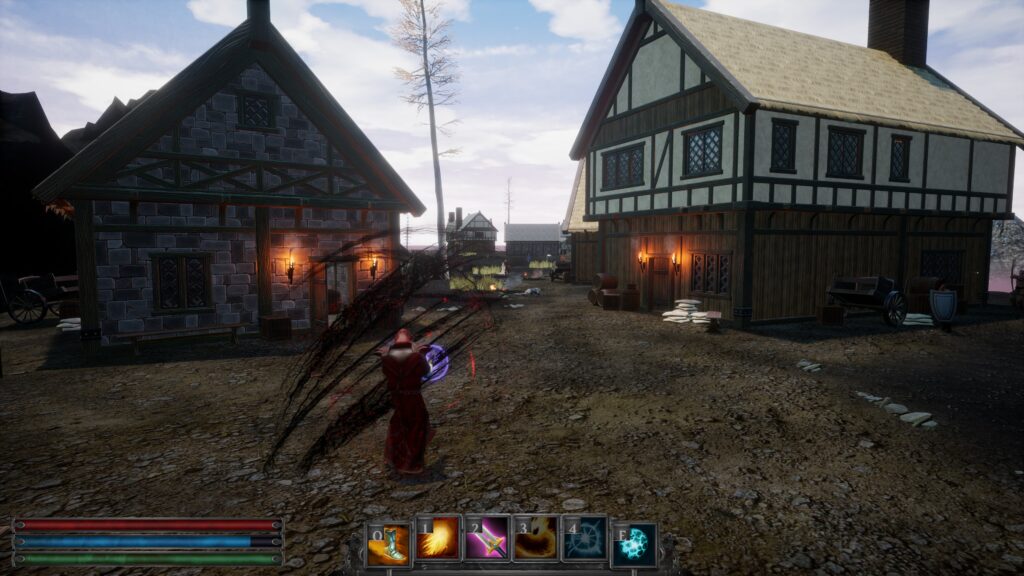
With that in mind, will you go out of your way to help a town being raided by bandits or look the other way? Help a sobbing kid find somewhere to stay after losing his mom or rob the pouch of cash from her fresh corpse? Every mountain has an event, and while you can choose to mind your own business, at times you will have to take things into your own hands, which is where the 3rd person sections come into play. You will be thrown into a map, usually in the outskirts of an area, so you can get your bearings. This is where the game really lets you see the power you wield. Even your basic spells are akin to throwing an artillery shell at someone and with every building being fully destructible, that place will soon look like a warzone.
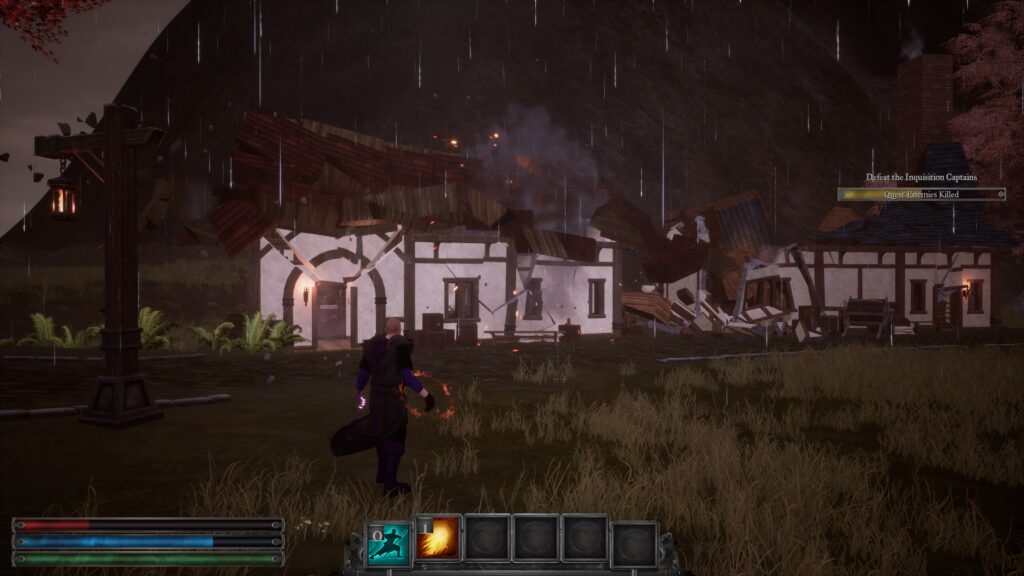
The Fictorum will have three meters to take into consideration. The first being his health, which does not regenerate and can only be healed via stores or resting on the overworld, allowing the Inquisition to gain on you. Secondly is his mana bar that does actually regenerate, and trying to cast spells while its empty will take some of your health. Finally is your stamina meter that allows you to sprint right out of danger’s way. What all that ultimately means is that you are encouraged to cast to your heart’s content, but must be really wary of being on the receiving end yourself. Easier said than done when you have archers firing at you, swordsmen trying to flank you, and other mages slinging their own destructive spells your way. You can take quite a few hits, it is the slow but sure dwindling of your health that will make future situations deadly.
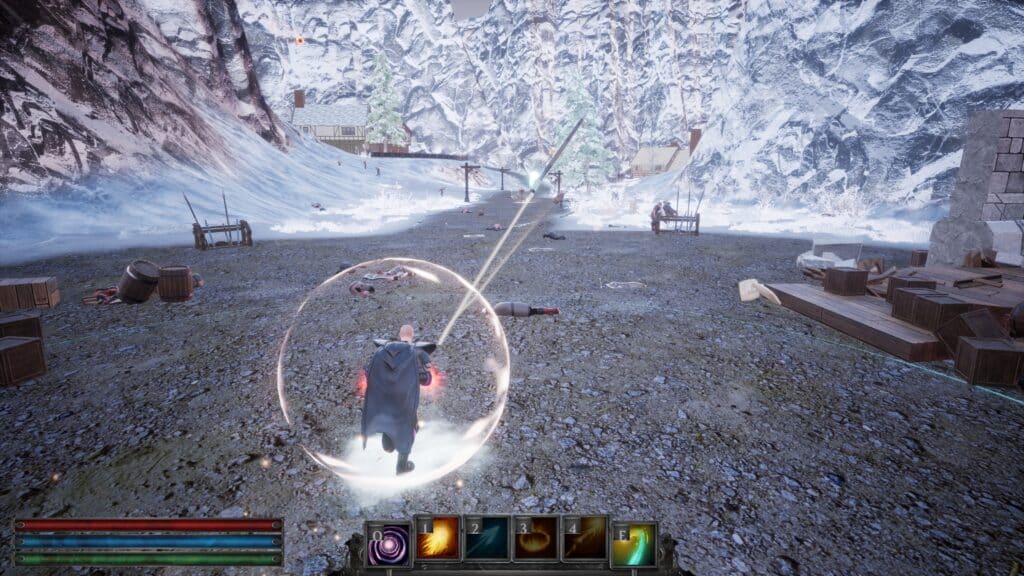
It has a pseudo rouge-like feel to it, in that everything from the over-world, events, and items will be randomly generated. You can even turn on a perma-death option. This means that you can have either an easy journey as you find some really good spells and gear near immediately, or have to make do with what you’ve got. And what you’ve got as previously stated, is far more power than any foe regardless of your luck with the RNG. There are multiple difficulty levels for every kind of gamer to choose from when you begin a playthrough, though playing it tactically will get you further than trying to brute force your way to victory. Sling a fireball at the side of a building to block a group’s advance toward you with the debris, place a trap on a bridge to collapse it and plunge enemy soldiers to their doom, or simply get to a vantage point to take them down from afar.
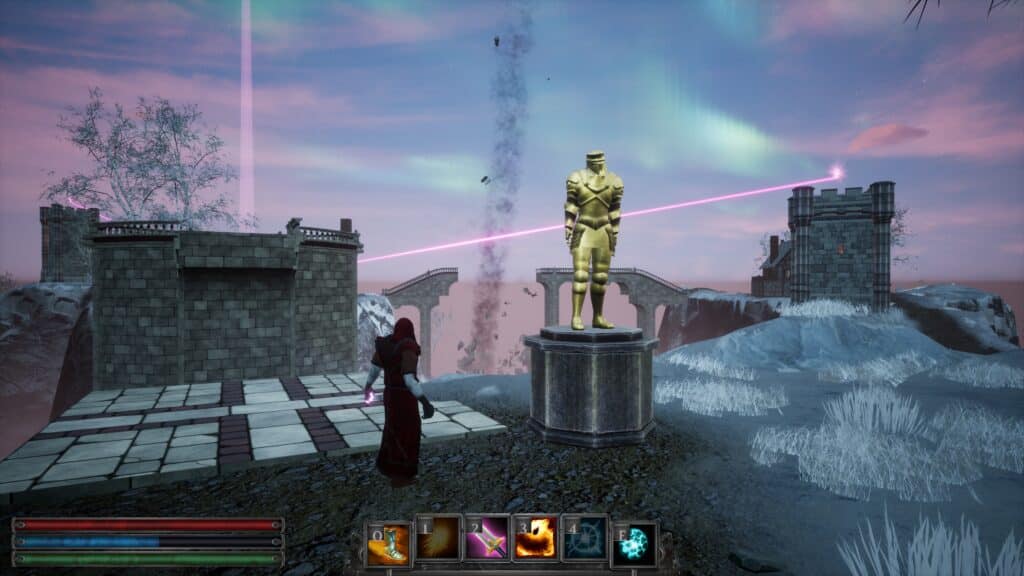
As you may imagine with all those destructive tactics, that can and will lead to quite a few civilian causalities. There are no penalties whatsoever for their deaths and your Fictorum is no hero either. Storywise, at best he is an anti-hero if you try to be good at every turn, though he is probably just as bad or worse than those he is fighting against. The only reason other than your own morals to watch where you fire is if you accept a quest to defend a village or its people, in which case you won’t get a reward for your efforts if you fail. Weaving in and out of packed villages streets facing another wizard without accidentally nailing someone else or destroying their homes is hard enough starting off, it is an entirely different manner as you progress.
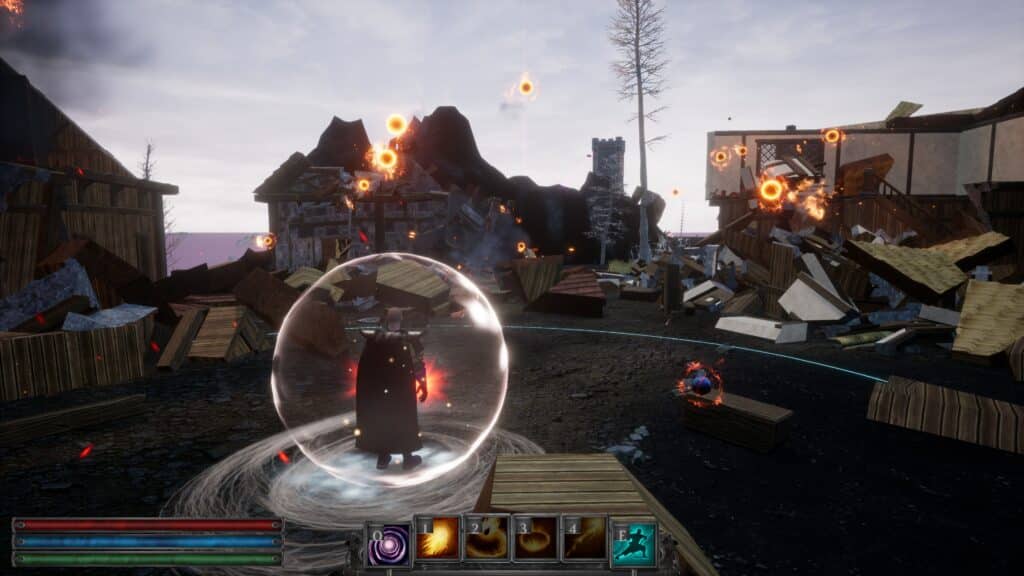
If your starting spells are akin to flinging around artillery shells, the later spells are more like setting off several hydrogen bombs. It becomes less of a case of trying not to kill a passerby, but of not accidentally leveling the entire city several times over. Luckily your own magic doesn’t damage you or you would be just as much a danger to yourself as to others. Neither does any debris. An entire building can collapse over your head and you will be no worse for wear. It can be rather odd to have a colossal chunk of a city wall fly into your face to no effect, though with the large scale destruction, having it damage you would be cheap. Some manner of visual effect like an invisible force-field to stop it from reaching you would do wonders. Maybe ceasing his mana regeneration while having said field up to make the destruction physics less abusable, like leading people into a building then collapsing the roof over yourself.
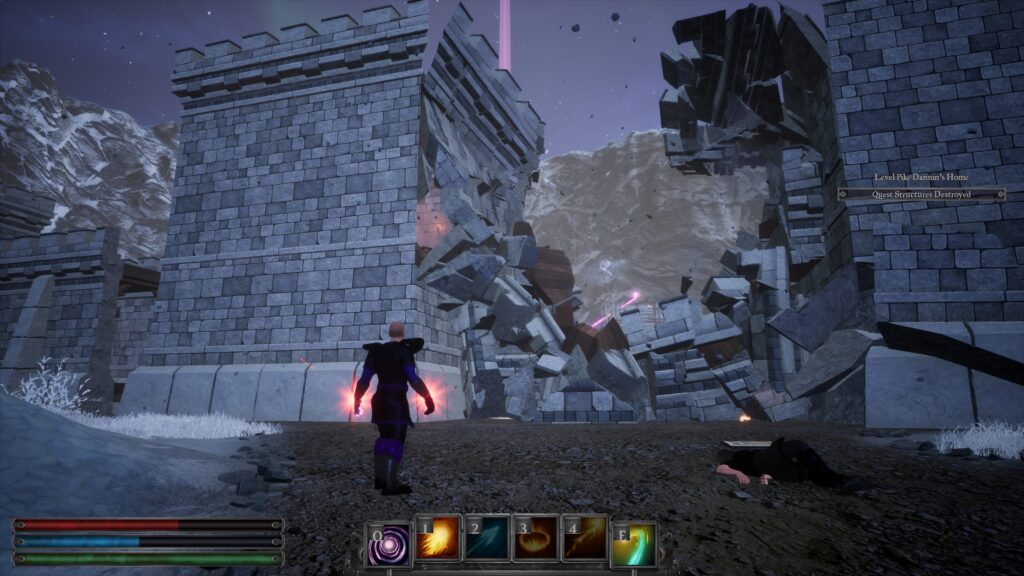
In total, you can have up to four unique spells equipped at any one time. These fall into either Fire, Ice, Lighting, and an odd Christmas themed set. Your mage class will have certain spells that he starts off with, but he does not have any advantages or disadvantages to any element. You can use a fireball to blow up a building, an ice spear to impale an enemy from across the map, then unleash a stream of electricity at closer foes within a span of seconds. The spells come in the form of Tomes that you can sell off later or just keep in your inventory when not equipped. What makes Fictorum truly unique is the Rune system. Up to three runes can be added to a spell to wildly change its original form and usage. You can turn a single meteor into a storm of them that will rebound as soon as they touch the ground to cause more mayhem, a shock-wave blast into dozens of magical structures that will detonate when it senses an enemy, or have a swarm of explosion casting orbs to name a few possibilities.
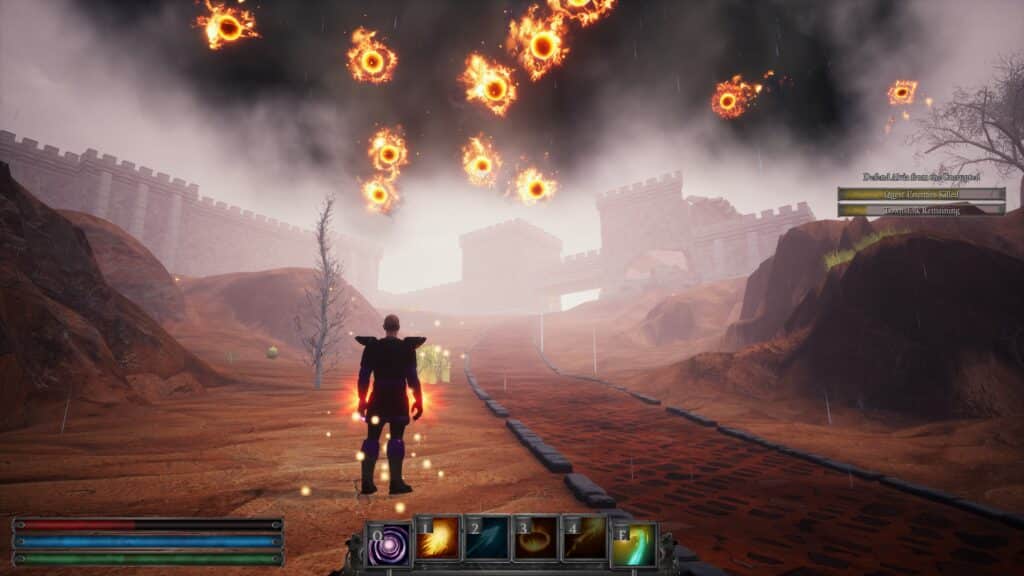
There is so much to experiment with here, every spell can become something entirely new. It is a really neat system that encourages creativity and greatly encourages replay value as even if you find the same spell, you will likely have a different set of runes to tinker with. They will add to the overall cost of casting a spell however, so having all four of your equipped spells be an apocalyptic-sized force of nature may not be all that wise since you may have little to no mana left after unleashing it. Having a small, efficient spell as a backup can be invaluable to pick off any pesky survivors. When your mana is low or drained is when you are the most vulnerable. You do not want to be completely drained as a solider tries to jam his sword through your chest, since unleashing another spell with no mana will harm you in any case, kind of defeating the point. Luckily, it recharges very quickly, so you can easily create some distance or dodge a few arrows if you have enough stamina and be back on the offensive within seconds.
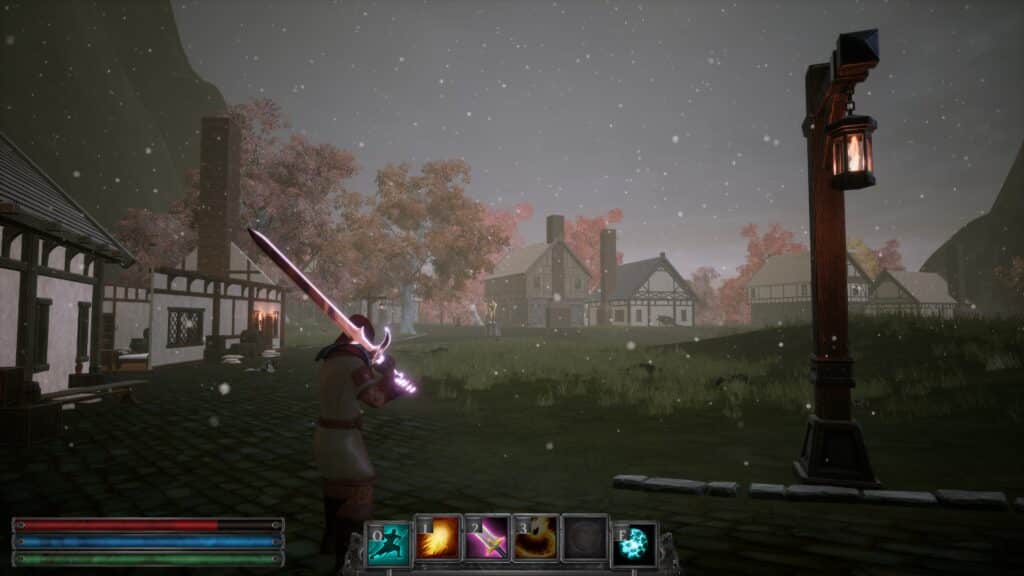
Looking at the screenshots, you will notice there actually seems to be six spells. That is kind of the case. The extra two, which are bound to the Q and E keys are in fact activatable abilities. Some may take a negligible amount of mana to use, though they are mostly defensive in nature, unlike regular spells. They must be bound into rings and equipped to be used. You can later destroy the item to transfer the effect into something else. With them, you can do a variety of cool things ranging from teleporting around, creating a wall of earth to shield you, jump insanely high into the air, or time freeze any projectiles coming your way. You can’t tweak them like spells, though upgrading the rings they are implanted into will increase their effects, and at times even lower their cooldown timers to let you use them again sooner.
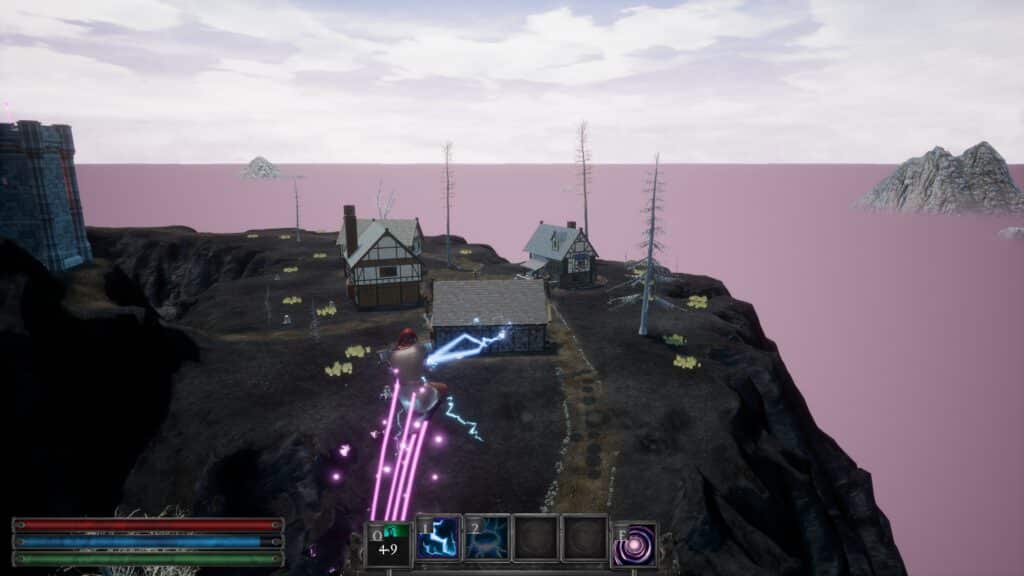
Far, far rarer are the passive enhancements that can be put into the rest of your gear. There are some for your boots that leave a trail of ice that will slow any enemy that crosses it, gloves that greatly increase your attack speed, and armor that allows you to fly. I’ve never encountered a scroll for these gear enhancements, unlike the ones for rings that are not too uncommon. They always seem to come installed into a piece of gear whenever you do find one, so you will always have to destroy a valuable item to get them into existing gear. It is strange that they decided to make them so rare, considering how overpowered the rest of your spells and abilities are in comparison to the effects gear enhancements give.
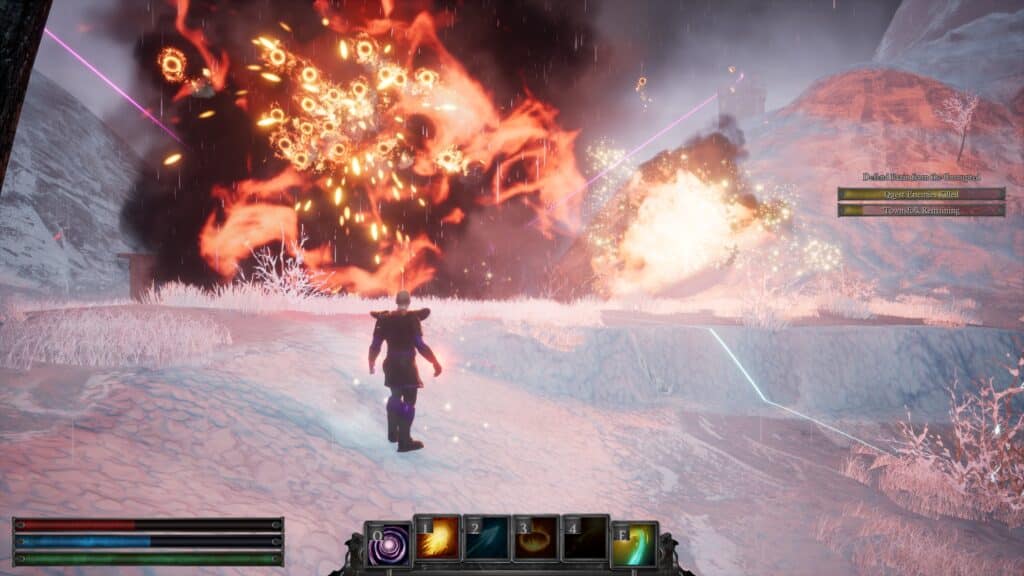
After spending over 20 hours on this title, I wouldn’t have even known about being able to fly if I haven’t unlocked a starting class that comes equipped with a piece of gear that lets him do so. Makes one wonder what other things one could possibly miss out on. That also brings me to the slightly broken progression pacing. As you travel towards the leader of the Inquisition across nine randomly generated maps called Chapters, you are given the choice to continue on after slaying him. It seems that a lot of the higher tiered objects come into play after you have already beaten it and what you are doing no longer makes sense story-wise. There is little motivation to continue on unless you want an achievement for making it to chapter 16. This is made even worse if you choose to play the Abridged mode, which is only three chapters and you’ll likely still have little else aside from your basic spells by the end.
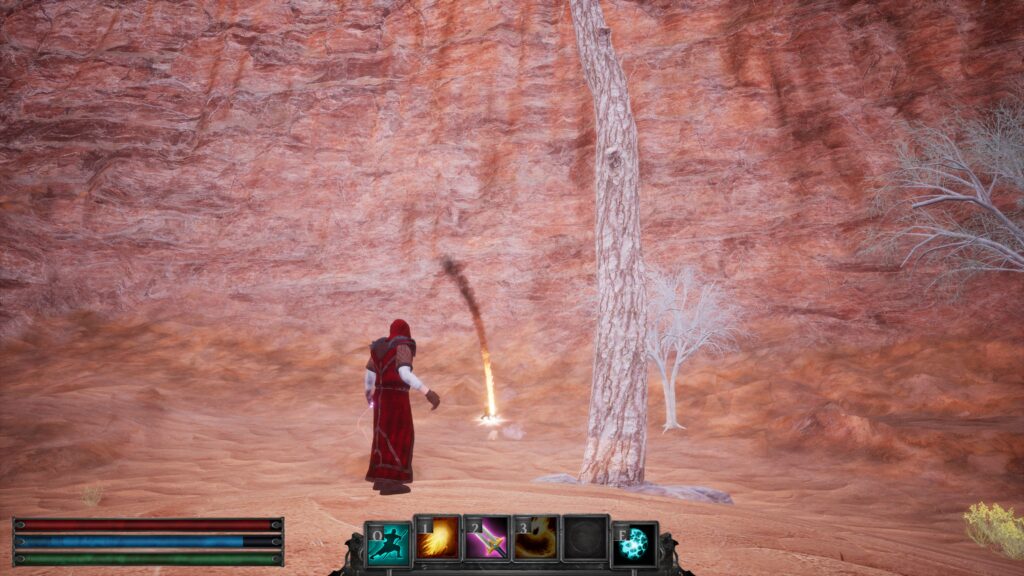
While listing my complaints, I should mention the AI. They have a near-clairvoyant aspect to them. As soon as they spot you, everyone and their mother will know your exact position until they are all dead. At times they can even see you through walls or cliffs when still undetected. I’ve yet to mention the Corrupted and for good reason. They fight the exact same as the humans, in that they simply all make a b-line straight towards you with no sense of self-preservation or strategy. Both are mindless hordes, though do possess some varying units to differentiate things up between them somewhat. That leads me to another gripe. Many of the higher surfaces like roofs or canyon tops will have your character slide right off. It takes the fun out of the high jump ability and forces you, a ranged fighter by nature, to stick to the ground.
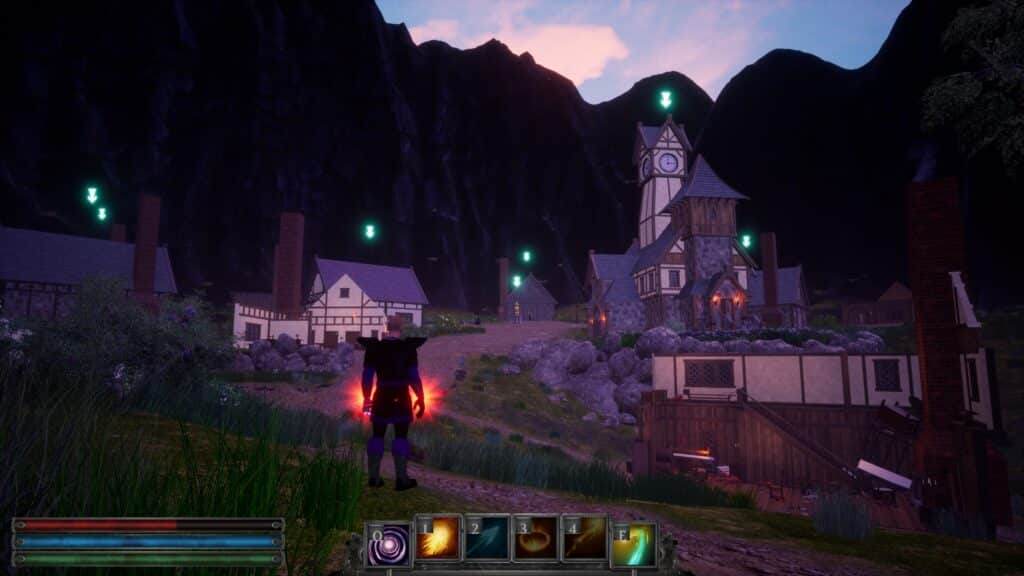
I wouldn’t call the combat great, though with the enormous amount of customization and options that are at our disposal, it is most definitely a ton of fun regardless. The Michael Bay levels of destruction and the brief tactics it offers before everyone rushes toward you is icing on the cake. If I started talking about even a fraction of the memorable moments I’ve had with Fictorum, we’d be here all day. So let’s talk about the shaping system instead, shall we? Holding down the right mouse button will slow down time and allow you to morph your current spell according to the three runes you’ve set for it. Dragging it to one corner of the magical triangle will amplify that chosen rune. So say you have a rune that makes your spell automatically seek out its target. That effect will be far stronger if you shape it and makes it more likely to hit its mark despite how much your foe moves around.
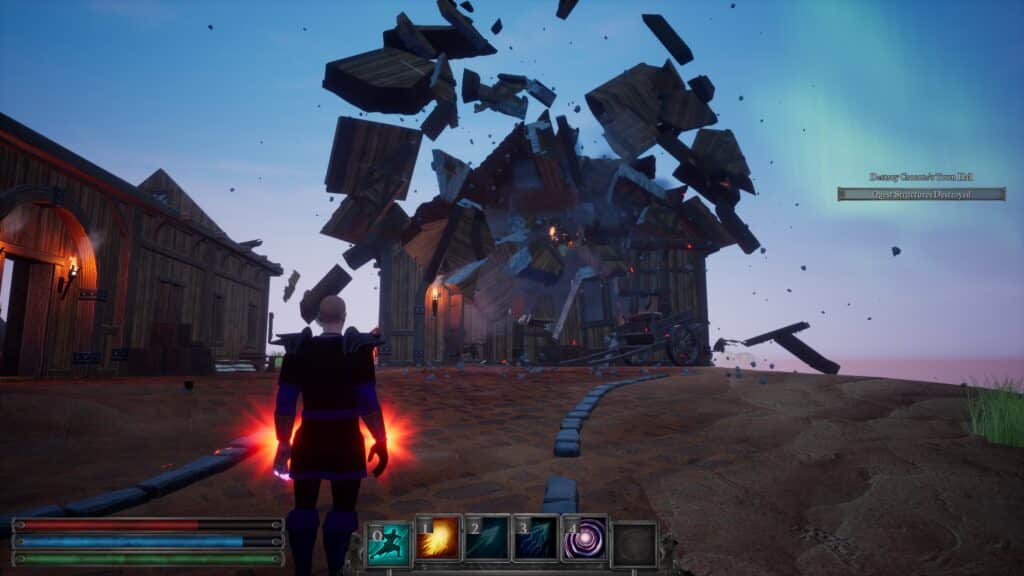
You can amplify all three of your spell’s runes at once as well. The downside to this is that it costs more to cast and it will also drain your mana until you actually do cast it. Another trick up your sleeve is a magical vision that lets you see where all your enemies and objectives are. This comes in particularly handy when your enemy is of the invisible variety. It also saves you the time of searching every house one by one for loot. You know exactly where any valuable item may be, making it all the more intense when you are in a fight and desperately trying not to destroy the house containing it. Your mana will not regenerate when using this magic vision, however, making it best used to scout an area or quickly be able to see when the area is brimming with explosions and particles.
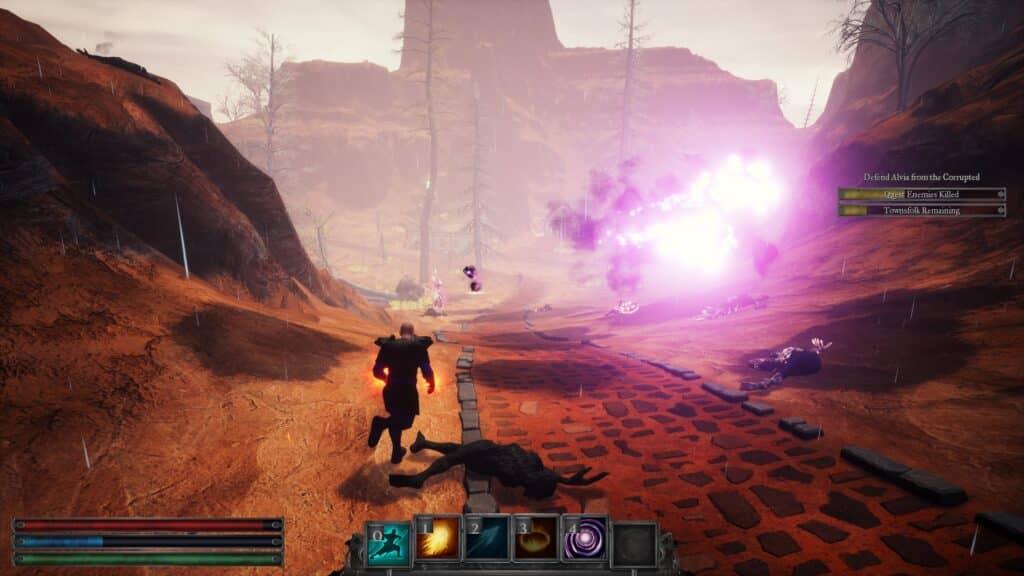
In this world, the currency is a magical dust. Being a great wizard, you can convert any items into dust on the spot for some quick cash, though selling it to a vendor will produce better profits. That, in turn, can be used to buy new items or more importantly, upgrade existing ones. Dust upgrades just about everything from your gear, runes, and spells. As you may imagine, with so many things relying on the same currency, it is always in short demand. That makes it particularly painful when you don’t have time to rest on the over-world if the Inquisition is far too close for comfort and must shell out a hefty sum for some healing.
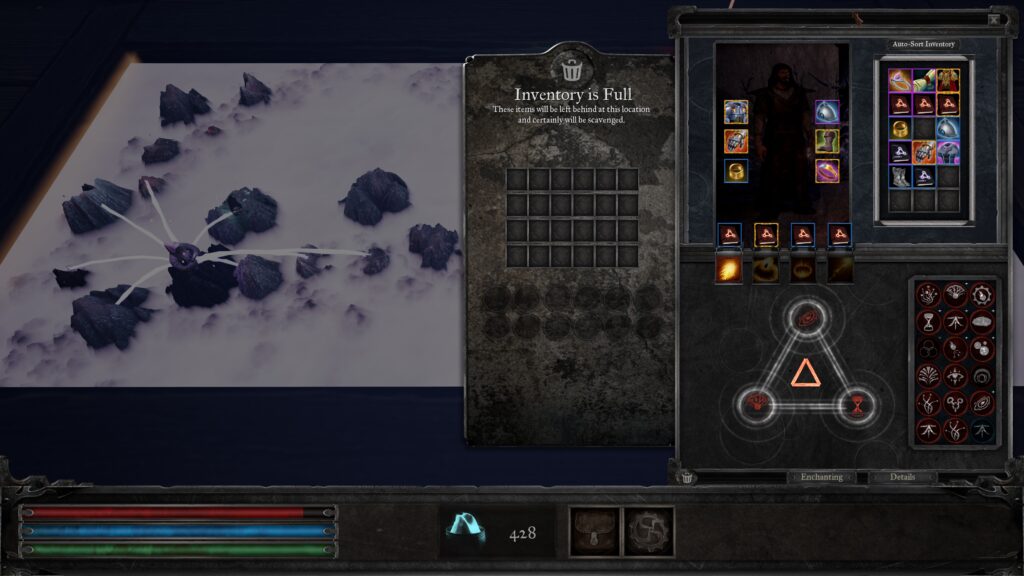
All told, while Fictorum has some flaws like it’s AI, small amount of gameplay areas to see, and a weird progression curve where you get all the good stuff after completing the story, the good far outweighs the bad. It is easily the title that best captures the feeling of being a legendary mage, with the destruction system really enhancing the feel of casting spells that in any other game would belong to a world-ending final boss. The fact that your health doesn’t regenerate and healing either requires a sizable amount of currency or resting which brings the Inquisition forces ever closer to your position, keeps fights feeling dangerous, despite all your power. Most of all, its main strength lies on the sheer amount of customization options at your disposal to make any spell you come across your own tailored weapon. Fictorum isn’t perfect, but I certainly wouldn’t hesitate to recommend it to anyone, especially those with a love for both twinkering and playing as mages.
- Manus Dei Review - April 25, 2025
- That’s Like A Dream Review - April 23, 2025
- Acrolyte Demo - April 11, 2025